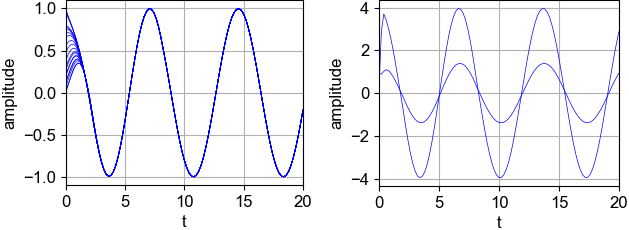 |
pyclustering
0.10.1
pyclustring is a Python, C++ data mining library.
|
 |
pyclustering
0.10.1
pyclustring is a Python, C++ data mining library.
|
Model of oscillatory network that uses Landau-Stuart oscillator and Kuramoto model as a synchronization mechanism. More...
 Inheritance diagram for pyclustering.nnet.fsync.fsync_network:
Inheritance diagram for pyclustering.nnet.fsync.fsync_network: Collaboration diagram for pyclustering.nnet.fsync.fsync_network:
Collaboration diagram for pyclustering.nnet.fsync.fsync_network:Public Member Functions | |
| def | __init__ (self, num_osc, factor_frequency=1.0, factor_radius=1.0, factor_coupling=1.0, type_conn=conn_type.ALL_TO_ALL, representation=conn_represent.MATRIX) |
| Constructor of oscillatory network based on synchronization Kuramoto model and Landau-Stuart oscillator. More... | |
| def | simulate (self, steps, time, collect_dynamic=False) |
| Performs static simulation of oscillatory network. More... | |
 Public Member Functions inherited from pyclustering.nnet.network Public Member Functions inherited from pyclustering.nnet.network | |
| def | height (self) |
| Height of the network grid (that is defined by amout of oscillators in each column), this value is zero in case of non-grid structure. More... | |
| def | width (self) |
| Width of the network grid, this value is zero in case of non-grid structure. More... | |
| def | structure (self) |
| Type of network structure that is used for connecting oscillators. | |
| def | __init__ (self, num_osc, type_conn=conn_type.ALL_TO_ALL, conn_repr=conn_represent.MATRIX, height=None, width=None) |
| Constructor of the network. More... | |
| def | __len__ (self) |
| Returns size of the network that is defined by amount of oscillators. | |
| def | has_connection (self, i, j) |
| Returns True if there is connection between i and j oscillators and False - if connection doesn't exist. More... | |
| def | set_connection (self, i, j) |
| Couples two specified oscillators in the network with dynamic connections. More... | |
| def | get_neighbors (self, index) |
| Finds neighbors of the oscillator with specified index. More... | |
Model of oscillatory network that uses Landau-Stuart oscillator and Kuramoto model as a synchronization mechanism.
Dynamic of each oscillator in the network is described by following differential Landau-Stuart equation with feedback:
\[ \dot{z}_{i} = (i\omega_{i} + \rho^{2}_{i} - |z_{i}|^{2} )z_{i} + \frac{1}{N}\sum_{j=0}^{N}k_{ij}(z_{j} - z_{i}); \]
Where left part of the equation is Landau-Stuart equation and the right is a Kuramoto model for synchronization. For solving this equation Runge-Kutta 4 method is used by default.
Example:
Example of output dynamic of the network:

| def pyclustering.nnet.fsync.fsync_network.__init__ | ( | self, | |
| num_osc, | |||
factor_frequency = 1.0, |
|||
factor_radius = 1.0, |
|||
factor_coupling = 1.0, |
|||
type_conn = conn_type.ALL_TO_ALL, |
|||
representation = conn_represent.MATRIX |
|||
| ) |
Constructor of oscillatory network based on synchronization Kuramoto model and Landau-Stuart oscillator.
| [in] | num_osc | (uint): Amount oscillators in the network. |
| [in] | factor_frequency | (double|list): Frequency of oscillators, it can be specified as common value for all oscillators by single double value and for each separately by list. |
| [in] | factor_radius | (double|list): Radius of oscillators that affects amplitude, it can be specified as common value for all oscillators by single double value and for each separately by list. |
| [in] | factor_coupling | (double): Coupling strength between oscillators. |
| [in] | type_conn | (conn_type): Type of connection between oscillators in the network (all-to-all, grid, bidirectional list, etc.). |
| [in] | representation | (conn_represent): Internal representation of connection in the network: matrix or list. |
| def pyclustering.nnet.fsync.fsync_network.simulate | ( | self, | |
| steps, | |||
| time, | |||
collect_dynamic = False |
|||
| ) |
Performs static simulation of oscillatory network.
| [in] | steps | (uint): Number simulation steps. |
| [in] | time | (double): Time of simulation. |
| [in] | collect_dynamic | (bool): If True - returns whole dynamic of oscillatory network, otherwise returns only last values of dynamics. |